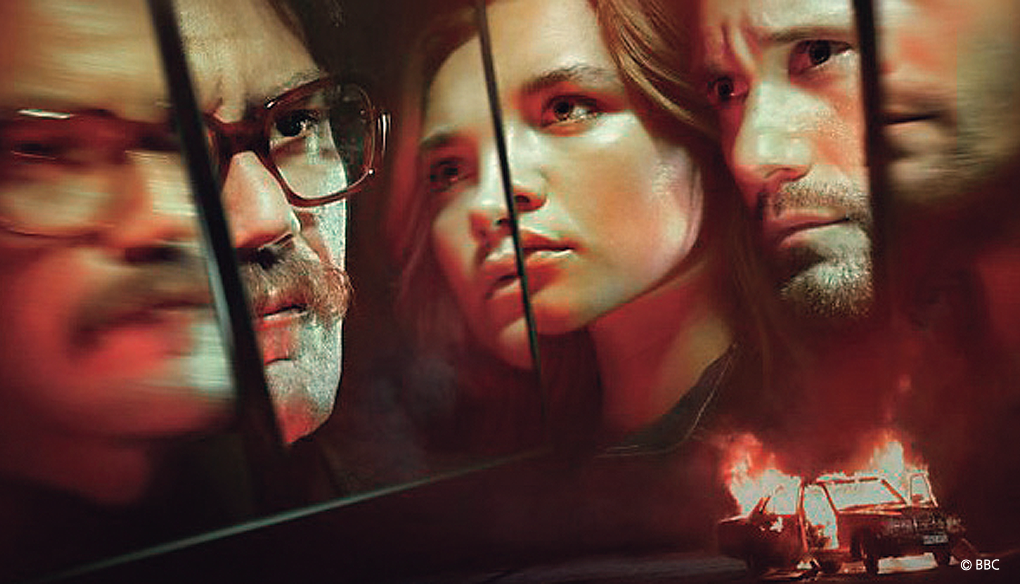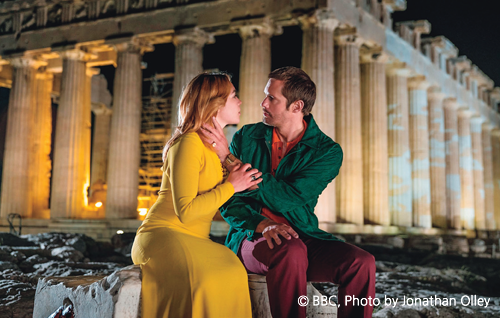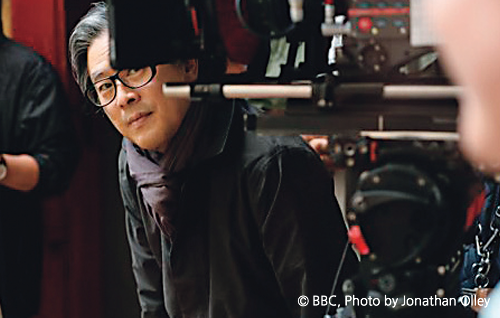Acclaimed Korean movie director Park Chan-wook explores a fragile separation of reality and acting in his TV adaptation of the classic John le Carré spy novel “The Little Drummer Girl.” In the 2018 miniseries for the BBC, Park draws on his experience of living in a divided nation.

Poster image of espionage thriller “The Little Drummer Girl” co-produced by the BBC and AMC. The TV miniseries is based on John le Carré’s novel by the same name, set against the IsraeliPalestinian conflict.
Spy novelist John le Carré took a leap with “The Little Drummer Girl” in 1983. His backdrop in this novel was the Israeli-Palestinian conflict, instead of the Cold War, and terrorism and the ambivalence lying underneath cloak-and-dagger espionage. His female protagonist played a larger role, allowing more pages for romance. The departure paid dividends, earning Le Carré recognition for his literary achievement beyond the spy thriller genre.
The novel was adapted for a movie in 1984, and last year it underwent the idiosyncratic touches of director Park Chan-wook in a six-episode TV miniseries. It aired in Britain and the United States in late 2018, then in Korea in March this year, attracting high viewership in each market.
Idiosyncratic Touches
Park’s filmography includes “Joint Security Area,” released in 2000, which depicts an ill-fated friendship between North and South Korean border guards stationed at the Demilitarized Zone. His attraction to “The Little Drummer Girl” obviously stemmed from the novel’s rendition of the Israeli-Palestinian conflict. In a TV appearance years earlier, Park said it was difficult for him to judge which side was right in the conflict. Having grown up in a divided nation himself, he said he could relate to the situation, probably from a more ive viewpoint. In other interviews, Park said that he had read many of Le Carré’s works and was convinced that “The Little Drummer Girl” was his masterpiece.

The scene where actress-turnedspy Charlie played by Florence Pugh and Gadi Becker, her Israeli intelligence agent handler played by Alexander Skarsgard, meet for the first time in front of the Acropolis in Athens, Greece.

“The Little Drummer Girl” is the first TV series directed by Park Chan-wook. A fan of John le Carré himself, Park says he tried to maintain an ive perspective as he directed the miniseries.
Fiction and Reality
The premise of “The Little Drummer Girl” is the recruitment of a young British actress, Charlie, by Israeli intelligence to locate Khalil, a Palestinian terrorist conducting attacks in Germany. The mental and emotional state of the protagonist pulled by both sides of the conflict beguiled Park, whose films are known for raw subject matters and black humor.
In the plot, the idea to use an actress rather than a spy is hatched by Martin Kurtz, a high-ranking officer of the Israeli intelligence. He insists on an “artistic method” of infiltrating the heart of the Palestinian network. Charlie, who initially thinks she is auditioning for an acting role, is “cast” in the operation. Gadi Becker, a secret agent of the Mossad, Israel’s intelligence agency, is Charlie’s case officer giving her instructions.
She makes her way in and from here on, “acting” and “reality” become intermingled. Boundaries blur. Charlie has to pretend to be the lover of a dead Palestinian militant, and as part of the coaching, Gadi role-plays as the militant. The actress and the secret agent undergo subtle changes in their feelings, and Charlie becomes confused. She is not sure whether she is in love with the dead Palestinian or Gadi. She is conflicted as to whom she is deceiving, and furthermore which side is right, Israel or Palestine.
Park effectively engages the audience by adding detailed descriptions to Charlie’s complex emotional changes. At the same time, Kurtz, the spymaster of this high-level mission, is deeply involved in his role as the director in the “theater of the real.”
This miniseries is an outstanding adaptation of the espionage action genre, and at the same time it seems like a sort of “Acting 101” offered by Park. It continuously raises the question whether the characters’ behaviors are acting or real, and we come to the realization that the boundary between fiction and reality that we experience in our daily lives may be quite superficial.
Beyond Boundaries
The miniseries also reminds us how the invisible boundaries that we have taken for granted in an era of statism can be arbitrary and easily disintegrated. If so, is the actors’ acting just one of those many arbitrary boundaries? Isn’t it because of such boundaries that people of different nationalities, languages and ethnicities have been in disputes using weapons against each other in the name of survival? To Koreans who have lived in a divided nation, the brutality and futility of such boundaries is something they experience every day.
This production, supported by British and U.S. broadcasters and shown simultaneously worldwide, may itself be making a statement. It suggests how to bring down fictional boundaries and prejudices in the way global contents are produced and consumed in our era. This also seems to be signaling that Korean contents need to hurdle over the boundary of hallyu, or the Korean Wave, and take a bold step onto the world stage.